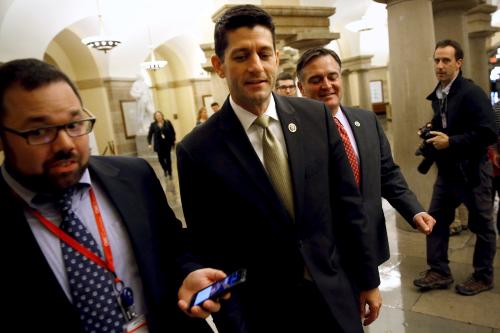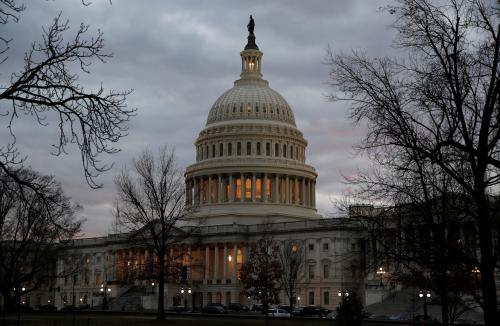Congress returns to Washington this week after seven weeks away, and they have a number of challenges to tackle in a short period of time before members decamp again in advance of November’s elections. Here are four storylines to watch:
1. The big-ticket item: appropriations
The biggest item on Congress’s September agenda is what to do about its unfinished appropriations work. The current fiscal year ends September 30, and while a government shutdown just weeks before an election is unlikely, Congress must take action in order to prevent one and keep discretionary federal programs running.
What a stopgap spending measure—known as a continuing resolution (CR)—will look like remains to be seen. Congressional Democrats and members of the House and Senate Appropriations Committees from both parties prefer a short-term CR that runs through the election. Under this scenario, Congress would return after November 8 for a lame duck session and (hopefully) finish appropriations work then, likely in the form of a large, omnibus bill similar to those used frequently in recent years.
Other Republican members, including members of the Freedom Caucus, Republican Study Committee Chair Bill Flores (R-Tex.), and Senate Majority Whip John Cornyn (R-Tex.), would prefer a longer-term CR that would fund the government into early 2017, possibly at lower levels than those agreed to in last fall’s budget deal. This faction argues that the kind of deal-making in the face of a deadline that facilitates omnibus spending bills disadvantages conservative priorities, and influential outside allies agree.
If Speaker Paul Ryan (R-Wisc.) and other House Republican leaders cannot resolve the internal divisions within their conference, they’ll likely be faced with a difficult choice: adopt a short-term resolution by relying on some Democratic votes, or approve a longer measure to which Senate Democrats and the White House are likely to object.
2. The smaller-ticket item: Zika
Among the most significant pieces of business left undone before the August recess was an emergency spending bill to provide additional funding to address the Zika outbreak. In late June, the House approved a measure allocating $1.1 billion towards Zika-related efforts. Senate Democrats, however, objected to language in the bill that would limit the ability of Planned Parenthood and other similar organizations to use the funds to provide contraceptive services and to other cuts in funding to Affordable Care Act programs included as offsets. Among the first votes the Senate will take later today is on a cloture motion on the bill. A similar vote failed, 52-44, in July, with only one Democrat voting in favor of the measure. If Congress is unable to adopt the standalone appropriations measure containing the Zika funding, the fight may get folded in to the wider budget fight discussed in item one, above. Not only might this be the straightest path to the finish line, but it would also be consistent with the broader trend of emergency spending getting caught up in broader budget battles.
3. One last veto fight?
Another piece of unfinished business for Congress is the National Defense Authorization Act (NDAA), the annual policy measure for the Department of Defense. House and Senate negotiators are at work on a version that compromises between the two chambers’ initial efforts, but the White House has threatened to veto both bills over a range of provisions. Among President Obama’s concerns regarding the Senate bill are provisions limiting his ability to close the detention facility at Guantanamo Bay. The House bill, meanwhile, contains a controversial expiration of supplemental war funding set for April 30, 2017. If enacted, that would likely require the new president to request supplemental spending in the very early months of his or her term.
President Obama, like President Bush before him, has vetoed relatively few bills (10) in his nearly eight years in office. Will the NDAA be number 11? Given that the president’s position on the bill is quite clear—indeed, provisions related to detainee policy and supplemental spending were among the reasons that the president vetoed the initial defense measure last year—congressional Republicans may be engaging in what political scientists Tim Groseclose and Nolan McCarty call “blame game politics.” Forcing the president to follow through on a veto threat, they argue, can be a tool to force him to go on record with potentially unpopular policy positions.
4. It’s the thought that counts
Though Congress has plenty of substantive matters on its plate between now and the pre-election recess, it is likely to devote some of its scarce floor time to symbolic votes that are meant to send signals to voters in advance of a competitive election in November. Some of these messaging votes are meant to embarrass the Obama administration, such as the likely vote in the House on a measure condemning the $400 million payment made to Iran on the same day four U.S. hostages were released. If members of the House Freedom Caucus get their way, meanwhile, the House will hold a vote to impeach IRS Commissioner John Koskinen. Other votes, however, are designed to send positive messages, like the measure exempting U.S. Olympians from taxes on their medals and other financial winnings.
Add in any unexpected surprises, and it’s sure to be an interesting sprint to the finish for Congress between now and the election recess.
Editor’s note: A previous version of this post gave the number of vetoes to date by President Obama as 12.






Commentary
Congress: Four things to watch in the next four weeks
September 6, 2016